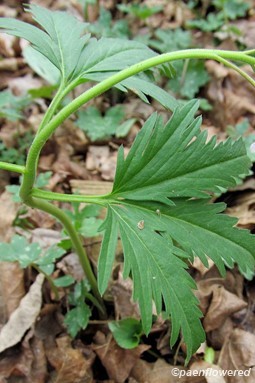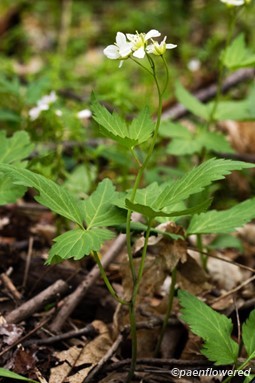Cardamine maxima
Cardamine maxima large toothwort
Add to MyPlants View Locations
This species differs from the cutleaf toothwort in having 3 leaves branching off the stem at different levels in alternating fashion rather than at the same level. The leaves also may be larger and less deeply cut, but I have seen literature that shows the leaves also resembling those of the cutleaf toothwart.
The flowers are white, pink or pale purple. Like other toothworts the flowers have four petals. Large toothwort grows 6-16 inches tall and is found in moist woods and along stream banks in northeastern United States and southeastern Canada. The blooming period is April through June, depending on location.
Although it is genetically distinct from the other species of toothwort some botanists in Michigan think it might be of hybrid origin because the fruit may not mature and the seeds may not be fertile. If it is a hybrid it is between C. concatenata and C. diphylla. It is also called the three-leaved toothwort. The USDA shows it in only four counties in Pennsylvania, but it is certainly more widespread since their data is based largely on herbarium specimens.
Habitat & Range
Very rare in low, wet woods.
Scattered throughout the state.
Range: North to New Brunswick and Québec,south to Pennsylvania and New Jersey, and west to Ontario and Wisconsin
Wetland code: Not classified
Phenology
Flowers April through early June.
Characteristics
Inflorescence terminal raceme with 4 to 10 flowers
Flowers 4 petals white or pink, 4 greenish sepals, 6 stamens (4 long, 2 short)
Cauline leaves 3 compound, alternate with 3 or 5 ovate leaflets
Basal leaves 2 or 3, similar in shape to cauline, compound with 3 to 5 ovate leaflets; tend to wither off before or shortly after flowering
Stems erect, simple or occasionally branched, glabrous or rarely sparsely hairy
Rhizome thickened, stout, tuberous, scaly and resembling teeth (thus the name toothwort)
Fruit long, narrow capsule, ascending and tapers to a pointed tip; 2-4 cm long; each capsule has numerous small brown seeds
Height 6 to 16 inches; rarely up to 23 inches
Plant Codes
PA status: PT (PA Threatened)
S-rank: S2 (Imperiled)
G-rank: G5 (Secure)
Cardamine maxima large toothwort
Synonyms: Dentaria maximaAdd to MyPlants View Locations












Comments
Have you spotted this plant in your area? We'd love to hear about your experience! Share your comments or questions about the plant below. Comments are moderated before posting.